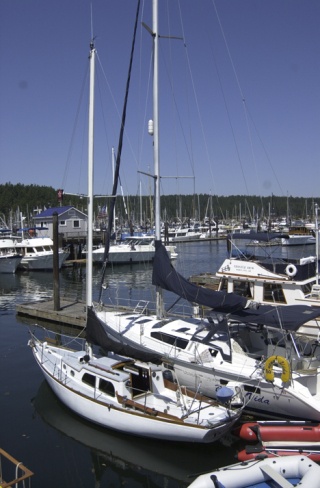If you rented property owned by the Friday Harbor Port District between Jan. 1, 2004 and Dec. 31, 2008, the state Department of Revenue may have some money for you.
The possibility of reimbursement exists for all renters of publicly-owned property — whether of an airplane hangar, boat slip, or a commercial site, according to Mel Kirpes, the Department of Revenue’s operations manager for miscellaneous tax programs.
Property owned by the port district, as well as other public agencies, is exempt from property taxes because it is owned by the public. But those who lease public property pay a leasehold tax of 12.84 percent of the amount of their monthly rent. In other words, if your rent for a boat slip is $100, your leasehold tax is $12.84 on top of that; if your rent is $200, your leasehold tax is $25.68, and so on.
The port district collects the leasehold tax and passes it on to the Department of Revenue.
Problem is, because of that property tax exemption, the value of port-owned land is not regularly determined by the San Juan County Assessor’s office. Renters of boat slips here and at other public-owned marinas say the leasehold tax they pay is more than they would pay in property tax, and have asked for reimbursement.
Kirpes said he’s received more than 100 reimbursement claims from people who rented slips at Friday Harbor Marina between 2004-08. While the issued was raised by boaters, the reimbursement applies to renters on all publicly owned property, including properties owned by the town and county.
San Juan County Public Works Director Jon Shannon said the county has three tenants at two separate locations. Compass Health leases the former Windermere Building in Friday Harbor; a kayak company and a store owner each lease space at the recently acquired Orcas Landing on Orcas Island.
The county assessor’s office is working on determining the value of the port district’s property. In the meantime, the state Department of Revenue is accepting requests for reimbursements that reflect the difference between what renters paid in leasehold tax and what they would have paid if they paid property tax.
Port Executive Director Marilyn O’Connor said she expects that gap will “disappear” with the increased valuation of port property. She emphasized that any reimbursement depends on the valuation of the property.
Kirpes said a boat-slip renter could get a reimbursement of several hundred dollars. “It depends on what they lease their slip for,” he said. “It’s based on what they pay for their rent.”
Larry Metcalf of Friday Harbor believes he’s owed about $750 for leasehold tax overpayment. “People have money owed to them that they don’t know about,” said Metcalf, who moved from Friday Harbor Marina in March 2008.
The reimbursement could be sizable for San Juan Boat Tours, which owns Island Commuter and Victoria San Juan Cruises. Owner Drew Schmidt didn’t know about the reimbursements and had no idea what his reimbursement might be, but said he pays a leasehold tax to the public-owned Port of Bellingham for office space that is over the water, as well as a leasehold tax for use of Friday Harbor Marina.
While the tax reimbursement is welcome news to payers of leasehold tax, it could mean a reduction in the Town of Friday Harbor’s share in leasehold tax revenue. The town receives 4 percent of the revenue generated by leasehold tax within the town limits — about $60,000 in 2008, according to the town budget.
According to Kirpes, 53 percent of leasehold tax is retained by the state for its general fund, 47 percent is distributed to counties and cities. Friday Harbor’s share goes into the current fund, which supports government administration, community development, fire protection, law enforcement, and parks. Other revenue sources for the current fund include property tax, sales tax, licenses and permits, fees for service, and grants.
Former county assessor Paul Dossett said his office stopped valuing port-owned property in 2000 because it is not required to assess tax-exempt property, and because his office lacked the personnel to do so.
State law — specifically Revised Code of Washington 84.40.175 — states that county assessors shall value tax-exempt property “when a request for such valuation is received from the department of revenue or the lessee of such property for use in determining the taxable rent …”
Dossett said his office never received such a request.



